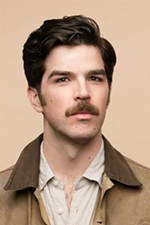Get Off Your Ass and Change the World
Nobel Prize winner Jody Williams speaks tomorrow at BookPeople
By Jessi Cape, 2:07PM, Fri. Sep. 6, 2013
Despite the exhausting recent headlines from around the globe, there are those people among us who see a problem and simply start working on a solution.
A persistent belief in the promise of a better world drives the physical manifestations of these individuals' hope, and they chip away at the issues, making positive ripples, often only rewarded by the personal satisfaction of their efforts. Every now and again, however, the timing is just right, and the work makes a landslide change around the same time the world wants to laud a new hero. Jody Williams' memoir tells the story of her journey from ordinary Vermont kid to 1997 Nobel Peace Prize Laureate and the extraordinary solutions she helped create along the way.
Jody Williams was the 10th woman, and third American woman, to receive the prize, awarded for her work with the International Campaign to Ban Landmines. The campaign, 1997 Nobel Co-Laureate with Williams, started in 1992 with only Williams on staff, and ultimately incorporated more than 1,400 NGOs, gathered the signatures of over 160 countries for the Mine Ban Treaty, and set a precedent to fast-track positive global change through the Ottawa process. Though many countries, including the United States and Syria, have yet to sign the treaty, the ICBL's campaign work focused on three aspects – disarmament, mine clearance, and victim assistance – using powerful but revolutionary techniques, such as strategic planning for enforcement and accountability. Also the recipient of 15 honorary degrees, and now a professor at the University of Houston, Williams continues her activism and serves as chair and co-founder of Nobel Women's Initiative.
Endorsed by activists ranging from Austin's own Turk Pipkin to fellow Nobel laureate Archbishop Desmond Tutu, My Name is Jody Williams explains how one person with an intrinsic need to make the world better struggled to find her path but continued to follow her heart. After protesting the Vietnam War, Williams took a brochure about the U.S. intervention in Central America, and her world changed. She coordinated the Nicaragua-Honduras Education Project and worked for Medical Aid for El Salvador, and these early endeavors set the course for her career that would, years later, literally change the world.
The book's foreword by Eve Ensler (Vagina Monologues) is a stirring testament to activism and its champions, including the indelible Williams, and it opens a story of sheer determination. Williams' incredibly honest first-person account of family, love, trauma, horror, and the balance of tedium and reward while working for human security is a wonderful testament to the power of one for the benefit of many. Also a poet, her writing is simple, rich with critical information, and profound – seemingly representative of the author herself: down-to-earth and straight to business, but containing an incomparably contagious spark. She's funny, too. You simply cannot finish reading this book without feeling the stir to help, whatever your cause may be.
In between travels to Houston, Shreveport, Norway, New York City, Wales, Mexico, and Ottawa, Jody Williams will stop in Austin at BookPeople at 7pm this Saturday September 7 to speak and sign her new book. We had the chance to ask her a few questions about gender issues, Syria, activism, and how to get started.
My Name is Jody Williams: A Vermont Girl’s Winding Path to the Nobel Peace Prize
by Jody Williams, foreword by Eve Ensler
University of California Press, 260 pp., $29.95
Austin Chronicle: What made you decide to sit down and write a memoir of your life's path thus far? Did you keep a journal all these years?
Jody Williams: I kept journals, yes, but most of it came from my memory. I decided to write it because I’m a grassroots activist. Receiving the Nobel Peace Prize didn’t change my basic take on how you change the world, which is bringing people together in common cause and working together to bring about change. And I wanted people to understand that anybody can participate in positive change.
If you skim through the book, I don’t come from a magnificent background: I was normal kid with some violence in my family because of my schizophrenic brother. I became engaged in trying to change primarily U.S. foreign policy in the beginning, but then other issues. I think through my story, I help ordinary people like myself understand that anyone who has the courage to get up off their butt and go and join an organization and work with other people for change can be part of change. It’s all those little combinations of people working for different causes for change that change our world. I wish more people would participate.
AC: In light of the possible strike in Syria – no doubt an extremely complicated scenario – would you comment on the fact that the potential military intervention is being classified as humanitarian in nature? It seems to tie in with your commentary that there is an American myth regarding our aid and that there is a very dark side to our national story.
JW: Like many people who work in peace and weapons and all that, I have been thinking a lot about the U.S. desire to attack Syria. I don’t support a military intervention, to be honest. And I’ve thought about this a lot. Something has to be done about the chemical attack, but I think that the more rational way to deal with it – even if it takes longer – is for the Security Council of the UN to recommend the case to the International Criminal Court because the use of chemical weapons is a war crime. Blasting away at the people in Syria is not going to resolve the problem. I was thinking of all of the attacks over the years, over the recent years, that the U.S. has made on the Middle East and North Africa: Libya. Somalia. Iraq. Toppling the government in Iran decades ago. And now we’re going to go and blast Syria?
If you are a person living in the Middle East and North Africa, what do you think of the United States? That at any opportunity the U.S. is ready and willing to attack people in the Middle East. It does nothing but earn us more enemies, and we already have more than enough in the region. Working as an international community to take the case to criminal court is a much more rational and useful path to follow, in my view. … And when the U.S. says they're humanitarian, I have a very hard time with that. I don’t think the U.S. knows what a humanitarian intervention really is.
AC: Many public figures are starting to address gender issues in a larger forum, such as Angelina Jolie's appeal to the UN regarding rape as a war crime. In your book, you reference your efforts through the International Campaign to Stop Rape & Gender Violence in Conflict through the organization you founded, the Nobel Women's Initiative. Could you tell me about your work in this realm?
JW: [Rape] is a war crime. It’s being treated in the international criminal court as a war crime. It’s already used in cases against war criminals. And the Nobel Women’s Initiative, as you know, launched a campaign to stop rape and gender violence in conflict, in May of last year … We deal with many issues of gender violence and women's role in peace-building and peacemaking. It's kind of a fundamental part of what we do at Nobel Women’s Initiative. I think, and I don’t think this is a brilliant observation, “women’s issues” are supposed to be the home – education of the children, grocery shopping – even when they work … and the issues that lock the world such as war, disarmament, etc. are the more serious aspects and "the rest should be left to the men." So part of what we do is forcing the community to listen to women’s perspectives on all of these issues. I think it’s critically important.
AC: Nonprofit NGO work can be grueling and tedious with little pay or recognition. Does the hope for the type of well-deserved celebration you experienced in Oslo drive you through the daily grind? Or is it just a cherry on top because you know the nitty gritty details are so important?
JW: I see the Nobel Prize as a tool that facilitates the work I do. That’s it. But I have to say that in the first years after receiving it, I had a very hard time, just trying to figure out what it really meant for me. When I finally became comfortable with it, really, I think was when we started the Nobel Women’s Initiative. Because the point of the Initiative, and us coming together, was to use our influence and access - because of having received the prize - to support women around the world and work with them - organizations that strive for the same goals we do, which is human security, not national security, and sustainable peace with justice and equality. Suddenly, the Prize was useful. It made sense to me. I feel like I get to share it with women around the world and I’m comfortable now, but I certainly wasn’t for quite a few years.
AC: Can you tell me about the social work class you teach at University of Houston?
JW: I've been at [University of] Houston since 2003, which also is amazing to me: 10 years, now. The point is to try to make people who work in social work areas recognize that social work, in its own way, is activism. And that there are places for social workers in international work as well, and to try to broaden their horizons to understand global justice and how they can contribute to it. It has been pretty fun most of the time.
AC: It's pretty cool to be speaking to you, a Nobel Peace Prize winner, the day after the 50th anniversary of the March on Washington. I love how you describe peace: "Sustainable peace is peace with justice and equality." And, from Turk Pipkin's movie, Nobelity, you're also known for saying that everyone can make a difference if we just get up off our asses and take action.
JW: Absolutely. You know, sitting in a room complaining with your friends about any and all of the things that bother you - like climate change or the tar sands pipeline, or whatever – is not a strategy for change. All you’re doing is making yourself feel somewhat good because you “care” enough to be agitated and talk with your friends. Feelings without action are completely irrelevant. What matters is taking that concern and channeling it into actions, with others, to address the problems you care about. Without that, you may as well just not even fret. Have a few beers and watch whatever football team you like.
AC:So what is one thing someone could do if they’re just really unsure about a place to start? You know, their heart’s in it, their brain’s in it, but they’re just kind of lost. Should they just Google something that they like?
JW: I think I’m interested in way too many things, unfortunately, but there are a few that really bother me. So, we started the campaign to stop rape and gender violence in conflict. … I am not suggesting that people should try to be me. But I am saying that if I have a couple of identifiable things that bother me, I find ways to work on them. Pick one thing. I don’t really care what the issue is, as long as it’s something that if you make it better for everyone, the world will be a better place. And then, start by volunteering – that’s how I started. Volunteer! If you don’t like the first organization you’re volunteering with, find another one working on the same issue. In today’s world with Google, there is no excuse.
Jody Williams speaks about her memoir tomorrow night (Saturday, Sept. 7, 7pm) at BookPeople (603 N. Lamar). Visit the BookPeople website for complete details.
A note to readers: Bold and uncensored, The Austin Chronicle has been Austin’s independent news source for over 40 years, expressing the community’s political and environmental concerns and supporting its active cultural scene. Now more than ever, we need your support to continue supplying Austin with independent, free press. If real news is important to you, please consider making a donation of $5, $10 or whatever you can afford, to help keep our journalism on stands.
Lina Fisher, July 26, 2023
Brandyce Ingram, Feb. 14, 2018
April 12, 2024
March 14, 2024
memoir, Jody Williams, Nobel Peace Prize, BookPeople, ICBL, Nobel Women's Initiative, Turk Pipkin, Nobelity, activism, Vietnam, Syria, landmines, gender issues, Angelina Jolie, UN










